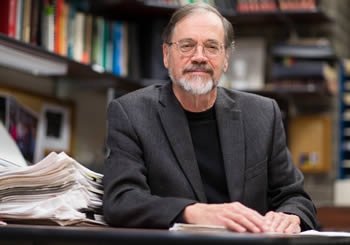Intellectual and Developmental Disabilities
Albert Einstein College of Medicine Receives Major Federal Grant for Research into Intellectual and Developmental Disabilities
December 20, 2016—(BRONX, NY)—The National Institutes of Health (NIH) has awarded Albert Einstein College of Medicine a five-year, $6 million grant to fund the Rose F. Kennedy Intellectual and Developmental Disabilities Research Center (IDDRC). The grant will also support a new research program focused on 22q11.2 Deletion Syndrome (22q11.2DS), an incurable genetic disorder associated with delayed intellectual development and psychiatric conditions, and some forms of congenital heart disease as well as other medical problems.

Steven U. Walkley, D.V.M., Ph.D.“The grant will provide critical support for dozens of ongoing studies in intellectual and developmental disabilities at Einstein and will result in new joint research opportunities and closer connections with our clinical colleagues at the Children’s Hospital at Montefiore (CHAM),” said co-principal investigator Steven U. Walkley, D.V.M., Ph.D., director of the IDDRC and professor in the Dominick P. Purpura Department of Neuroscience, in the department of pathology, and in the Saul R. Korey Department of Neurology at Einstein.
Einstein’s IDDRC was among the first 12 such centers that the NIH established in the 1960s and has pioneered research into typical and atypical brain development in children. It now supports more than 80 researchers who study neurodevelopmental conditions including autism, attention-deficit hyperactivity disorder, Rett and Williams syndromes, Niemann-Pick and other lysosomal storage diseases, neurocutaneous disorders, and infantile and childhood seizures.

Sophie Molholm, Ph.D.The newly created 22q11.2DS research program joins basic researchers across several departments to address the genetic and neurobiological basis of intellectual dysfunction. “By working together, we have the potential to significantly advance understanding of the biological mechanisms and pathways of intellectual impairment in this condition,” said Sophie Molholm, Ph.D., co-director of the IDDRC and associate professor of pediatrics, of neuroscience, and the Muriel and Harold Block Faculty Scholar in Mental Illness at Einstein.
The 22q11.2DS program will be led by Bernice Morrow, Ph.D., director of translational genetics, professor of genetics and the Sidney L. and Miriam K. Olson Chair in Cardiology at Einstein, an expert in genetic syndromes resulting in intellectual disability and congenital anomalies such as heart defects. As stressed by Dr. Morrow, “Studies of rare disorders, such as 22q11.2DS, with known etiologies and high incidence of intellectual disability, can provide novel inroads toward understanding underlying developmental mechanisms, which in turn assists in the generation of therapeutics.”

Judy Aschner, M.D.“This new research program will greatly facilitate our efforts to establish a 22q11.2DS clinic at CHAM,” said Judy Aschner, M.D., physician-in-chief at CHAM and the Michael I. Cohen, M.D., University Chair of Pediatrics at Einstein. “Children with this syndrome have multiple health issues and currently have to see a half-dozen or more pediatric specialists at different sites. With the new clinic, they will have access to all needed expertise in one location.” Once established, the 22q11.2DS clinic would be the only one of its kind in the region and one of just a handful nationwide. The clinic will be directed by Elaine Pereira, M.D., attending physician, division pediatric genetic medicine at CHAM, and assistant professor of pediatrics at Einstein.
The NIH grant (U54 HD090260) also supports four IDDRC research cores: a human clinical phenotyping facility, which enables human research on intellectual and developmental disabilities by providing services to Einstein investigators such as recruitment and characterization of participants for studies; a neurogenomics facility, which conducts epigenetic and genomic analyses of RNA and DNA from both human and animal tissues; a neural cell engineering and imaging facility, involved in studies that visualize and manipulate brain cells in animal models; and an animal phenotyping facility, which evaluates behavior, metabolism and brain function in models of intellectual disability.
Other Top Stories
9/11 World Trade Center Exposure Linked to Heart Disease Among NYC Firefighters
On Becoming a Physician: New Einstein Students Receive White Coats and Stethoscopes
Novel Therapy for Acute Migraine Shows Promise in Phase 3 Clinical Trial
First Complete Wiring Diagram of an Animal's Nervous System
Multimillion Dollar NIH Grant to Help Reduce Opioid Use & Get Care to People Who Need It
NIH Grant Funds $23 Million Study of Diseases Affecting People Living with HIV
New TAILORx Data Guides Adjuvant Therapy in Younger Breast Cancer Patients
Einstein Celebrates Its 61st Commencement
Bolstering Biopsies: Testing Patients' Individual Cells to Guide Treatment



Tablet Blog